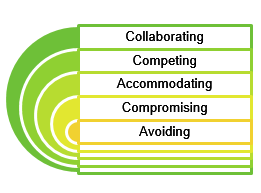Strategies for Success in Negotiations
Get What You Ask For: Strategies for Success in Negotiation with Mary Keegin, M.A. & Dr. Alice Stuhlmacher
There are endless situations that call for negotiations: interviewing for a job, vendor and sales relationships, conversations with a spouse, or even convincing the kids to go to bed. The possibilities are endless. No matter the situation, it’s extremely important for both sides to have a strategy in order for each side to get the most out of the conversation.
What is negotiation?
An older definition of negotiation:
The deliberate interactions of two or more complex social units, which are attempting to define or redefine the terms of their interdependence. — (Walton & McKersie, 1965, p. 3)
A more modern definition:
Says that negotiation is “the process by which people with conflicting interests determine how they are going to allocate resources or work together in the future.” — (Brett, 2007, p.1)
Strategies & Tactics in Negotiation:
The most important thing we learned in the workshop is that defining your strategy and tactics are key, and practicing helps.
So what are strategies? They are broad, general plans of action used to attain goals in negotiation. They aren’t super specific, but more of a general direction that leads you toward the overall goal.
Tactics: Short-term, adaptive moves designed to enact or pursue broader (or higher level) strategies. These are used during your negotiation in order to implement your strategy more effectively.
When planning out your strategy for your negotiations, it’s important to focus on three things:
- Setting & Attaining Goals
- Rehearsal
- Motivation
All three of these steps help to provide you with a standard to measure against when the negotiations are complete. Each will help you evaluate how you can improve and what you could have done differently.
How would some of these different strategies play out in your organization?

Sorenson (1999) researched conflict management strategies used by successful family businesses. -Family Business Review, 12(4), 325-339.
Collaborating led to positive family and business outcomes; accommodating/compromising led to positive family outcomes; competing led to negative family and business outcomes.
We all know what avoiding looks like, yet, sticking our heads in the sand and wishing the problem would go away is not a productive strategy.
Collaboration in Negotiation
In negotiations, both parties usually enter the discussion knowing what they want to get out of the process. However, most negotiations don’t end with each party getting exactly what they want. They usually have to try and find some sort of middle ground in order to reach terms that are of mutual benefit. Collaboration between parties is vital to get the most out of your negotiations.
When you enter a negotiation and try to control various aspects, it’s much easier for the other party to notice that you aren’t being 100% authentic or willing to find a mutual solution. But when you come into it with no ideas and are open to talking it out, seeking to understand the other side and collaborating, it will undoubtedly show the other party that you’re serious and up to discussing and finding common ground.
Being willing to collaborate and adjust your desires when negotiating has numerous benefits. Collaboration is about asking questions and listening. It illicit discussions. When we ask questions and find out what the other side wants and needs, it builds empathy and helps each side feel cared for, which will inevitably take your conversations even farther.
Relevant factors that impact strategy decisions
- Familiarity
- Trust
- Expectations to negotiate in the future
- Individual difference
- Organization culture
- Integrative potential of the negotiation
- BATNA (Best Alternative to a Negotiated Agreement)
Here are some more resources that could be of use to you:
- Harvard Law School Negotiation Blog(s)
- “Are you a Giver or a Taker?” – TEDTalk by Adam Grant
- “Women Don’t Ask – Negotiation and the Gender Divide” – Book by Linda Babcock
- “Ask For It: How Women Can Use the Power of Negotiation to Get What They Really Want” – Book by Linda Babcock
Share This:
